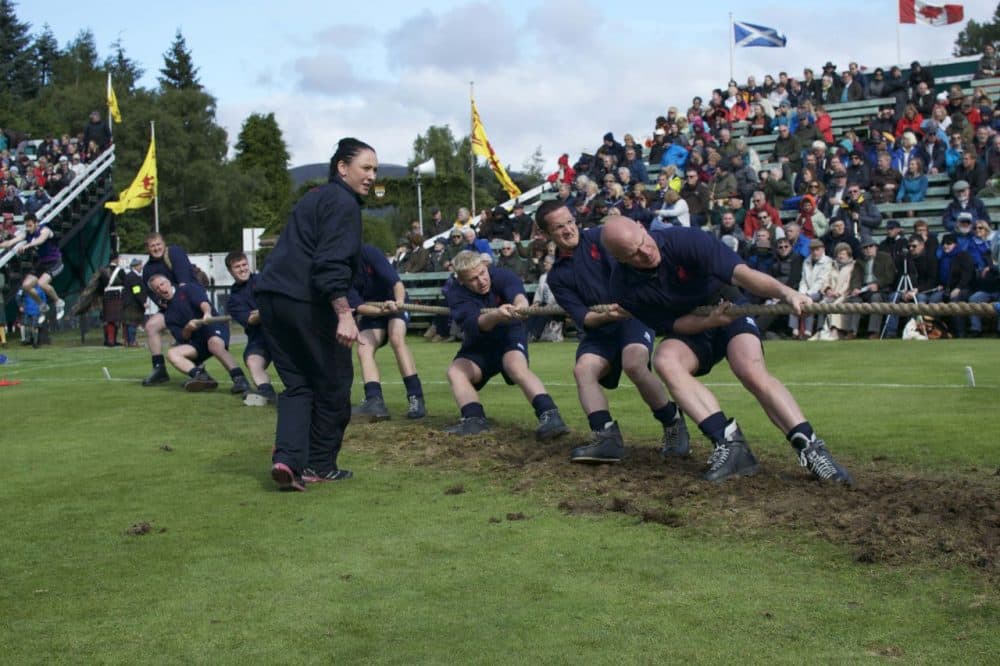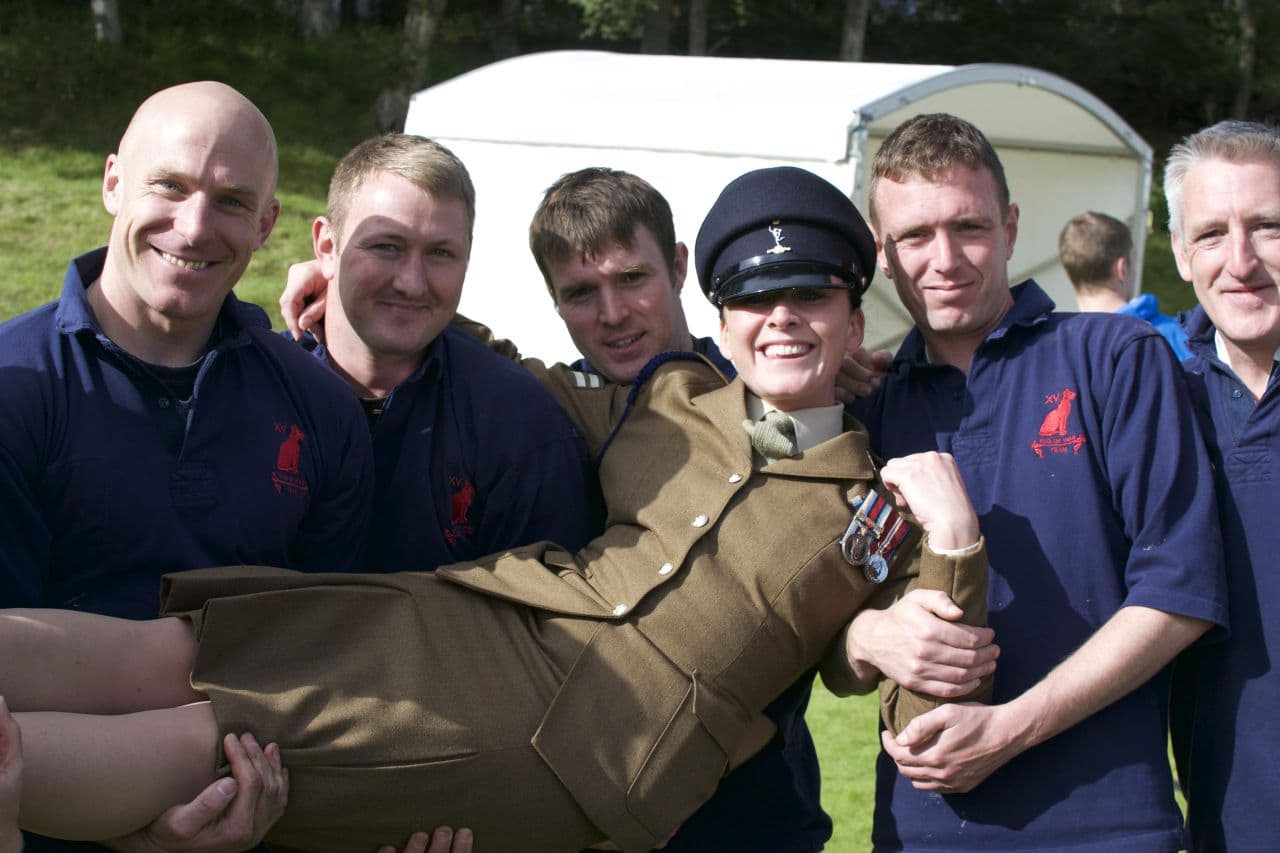Advertisement
Military Teams 'Play' Tug Of War For The Queen Of England

Nearly every year since coming to the throne in 1952, Queen Elizabeth II has traveled the short distance between her summer retreat at Balmoral to the Braemar Highland Games. This year, the 200th anniversary of the society that runs the event, was no exception. Reporter Asa Merritt also made the trip to Scotland this September, where he found a competition worthy of the royal nod.
The giant arena at Braemar was carved out of the Scottish highlands. On my left, 300-pound men flip giant logs in the air. On my right, teams of little girls dance highly technical routines. There are flags everywhere and bagpipes for days. Fifteen-thousand people fill the stands.
All the way back in the athlete staging area, I see a couple young guys with barbed wire tattoos smoking cigarettes. I walk towards them. A couple becomes a couple dozen, then a couple hundred.
The Royal Air Force is there. The infantry. There are even German soldiers. I talk to a clean-shaven twenty-something named Louis Fair to figure out what's going on.
"Where’s the squad from?" I ask.
"We’re from Portsmouth," Fair replies, "Portsea Island."
Tug of war is 50 percent skill and fitness, 50 percent you just gotta think you’re gonna win it. It’s a team sport. You’re only as strong as your weakest man.
Craig Petch, Signals Staff Sergeant
It turns out these soldiers are here to play in an international military tug of war tournament. Yep, tug of war. And, well, they're not exactly playing...
"Official tug of war is — it's quite a competitive sport," Fair explains. "There’s a rope, two teams, three ends. Basically, it’s the best of three ends. Whoever’s the strongest team wins it."
"Three innings?" I ask.
"Winnings," he says.
It sounds confusing, but it’s not. Eight guys a side. You pull a rope across a line. Best of three wins. I decide to pick a team to follow for the day. I go for the one with the coolest jerseys. The 15th Signals Regiment have these rad, red sphinxes on their shirts. They were formed in the '40s to support British troops in Egypt.
The Signals take their position on the rope. It looks like somebody took it off a battleship. At the front is a big, bald goofball.
Advertisement
"Tug of war is 50 percent skill and fitness, 50 percent you just gotta think you’re gonna win it," says Signals Staff Sergeant Craig Petch. "It’s a team sport. You’re only as strong as your weakest man."
An infantry unit in black and yellow striped jerseys lines up on the other side. The ref — a white-haired man in a kilt — lowers his arms, and the two teams go at it.
This is no playground battle. This is feet-jammed-in-mud, rip-your-shoulders-out, give-'em-hell, leave-it-all-on-the-field competition. The Signals pull the rope an inch at a time in their direction. Then in a final heave, they drag the rope across the line. One end down. But it’s a best of three.
In round two, the sphinxes take down yellow jacket guys quickly. Six more round robin matches to go. The top four teams will get to play in the finals in front of the Queen. I follow the Signals back to their giant canvas team tent to find out more.
Toby Courage, the commanding officer of the 15th Signal Regiment, is wearing his full dress uniform with all the medals and stripes.
"These games go back 200 years themselves," Courage says, "and I think all that time there’s been a armed forces involvement. Sport is a really good medium for developing some of the qualities you need as a soldier. There’s obviously the physical standpoint but there’s also the sort of mental discipline and robustness really that comes from competitive competition."

The Signals are coached by Adele Leonard, one of the few women on the field during this all-male tournament. She says that besides making good soldiers, tug of war changes up rank order in a way that’s good for the regiment.
"You’ve got a corporal as a coach tellin' a major what to do," Leonard says. "And it’s good because it shows you that the army’s not just about — when it comes to rank, obviously you’ve got to respect authority and things like that, but they’ll listen to their subordinates when they need to."
A caravan of black SUVs circles the track and pulls up to the royal grandstand. Queen Elizabeth II has arrived. She’s here to watch the finals. The Signals won five games and lost two during the round robin which means they’re in. Before their match, Leonard races off to change out of her tracksuit and into her full regalia. I ask Fair — the guy who taught me the rules -- what it means to compete in front of the queen.
"If you’re in the army, you’re probably a big fan of the royal family anyway," he says, "so it’s an absolute honor and a privilege to be doing that."
The Signals face off against a team they beat during the group stages, but this time it doesn’t work out. Petch is happy with his how team performed, though.
"We killed it," he says. "We did a lot better than I thought we would. I’m buzzin' for the lads, buzzin' for the lads. They did a great job."
I ask him how they're going to celebrate.
"Oh tonight, I can’t say that on air. Definitely not," Petch says. "You should come along, eh. You’ll find out."
This segment aired on October 31, 2015.